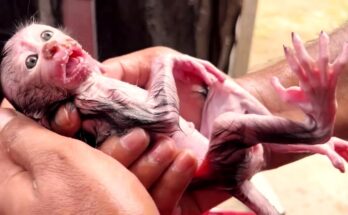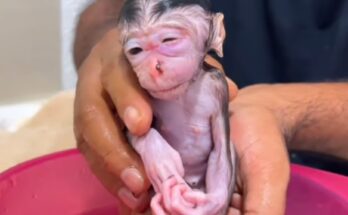The first day of a newborn baby monkey’s life is a fragile and critical time. Just like human infants, baby monkeys are born weak, helpless, and entirely dependent on their mothers for survival. Their tiny bodies lack the strength to move independently, and their muscles are too underdeveloped to support their own weight. Instead, they cling tightly to their mother’s fur, relying on her warmth and protection.
One of the greatest weaknesses of a newborn baby monkey is its vulnerability to environmental conditions. With a thin coat of fur, they struggle to regulate body temperature and are highly susceptible to cold and heat. Without the constant warmth of their mother, they could easily suffer from hypothermia or dehydration. In the wild, a mother monkey will keep her newborn close, often wrapping her arms around it to provide the necessary warmth and comfort.
Additionally, their immune systems are not fully developed, making them prone to diseases and infections. Even minor injuries or exposure to bacteria can be life-threatening. This is why a mother’s milk is essential—not only does it provide nutrition, but it also contains antibodies that help build the baby monkey’s immunity. Without this crucial nourishment, survival becomes even more challenging.
Another significant weakness is their inability to defend themselves. Newborn baby monkeys are completely defenseless against predators such as snakes, eagles, and larger carnivores. They rely entirely on their mother and the rest of the troop for protection. If separated, a newborn has little chance of survival.
Despite these initial weaknesses, baby monkeys grow rapidly. With constant care, nourishment, and protection from their mothers, they quickly develop strength, mobility, and awareness, preparing them for the challenges of life in the wild. The first day is just the beginning of a remarkable journey.


